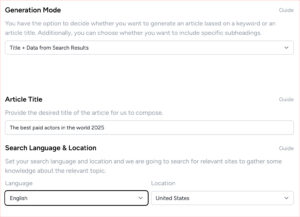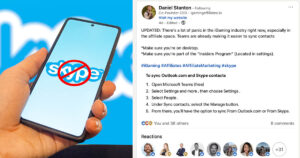Optimising keywords is essential for your SEO – the better your keywords, the more traffic you can potentially receive from the search engines. Sometimes though, it can actually be good to have the wrong keywords. We are talking about the case of misspelt keywords. Let’s look at why to use them (and when not to).
The number one reason is that humans aren’t perfect. They make mistakes when searching and enters a misspelled search term.
The second reason is that the competition on the correct spelling is fierce. The incorrect spelling though, that’s like a low hanging fruit still left untouched on the tree.
Bargain hunters have known about this since the dawn of the internet
My favourite watches are made by the Swiss company Tissot. They are good looking, made to last and not too expensive. It’s not hard to spell “Tissot” so nobody should be able to make that mistake, right? Well, it turns out it’s not so easy.
Currently there are more than 60 bad spellings on eBay, according to Typohound.com.
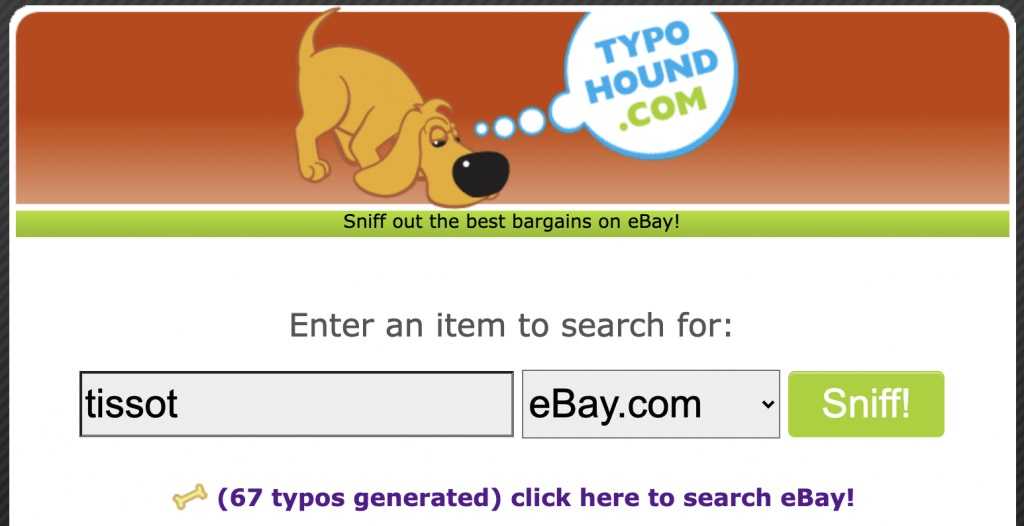
“Tissor” and “Tisso” being common mistakes. Here are two examples from eBay.
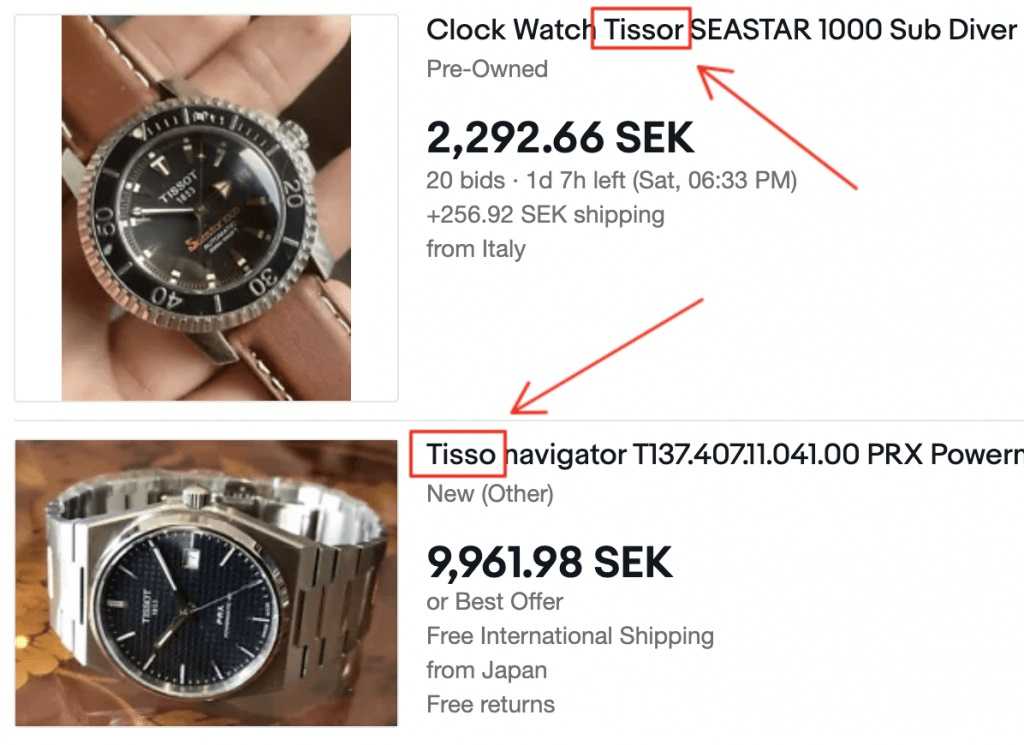
Internet users are humans, they make mistakes. Advertisers do it and so does people searching. You can use this to your advantage!
Top 3 reasons why misspelt keywords are valuable for SEO
1. Reach more people, increase your traffic:
Amazingly, one in ten searches are actually misspelt according to Google. This means that it is possible to capitalise upon this when creating your keywords. In fact, the opportunity to take advantage of this is even better when the keyword is commonly misspelt because many people are actually searching in Google with the wrong term.
Below, you can see the monthly search volume in the US for the word “affiliate” as well as all of the misspelt versions of the word. This clearly shows that even with some typos, there are substantial search volumes in place. For instance, “Affliate” is searched for around 16% of the time as the correctly spelt keyword.
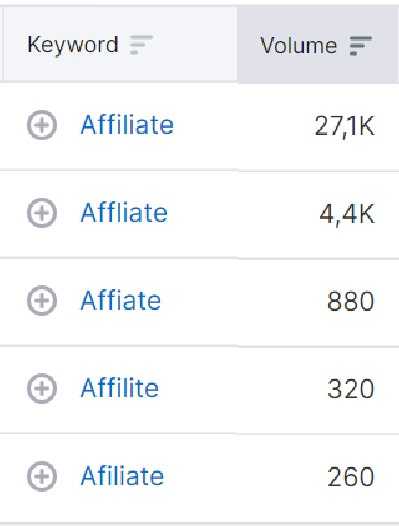
Impressively, some misspelt keywords can have even higher volumes, reaching as high as 10K. This means that they are actually a great source of inspiration for increasing traffic to your site.
Even though Google is becoming better and better at identifying when the user use the wrong spelling (Hello “did you mean ‘Affiliate’” feature) there is still some traffic passing through. Especially on terms where Google has not yet been able to determine what is the correct intent of the user.
Examples of topics where Google hasn’t 100% fixed this yet:
- Small casino niches
- New technology (NFTs, crypto, etc)
- Small languages (hello Estonian!)
2. Enjoy less competition
For the most part, misspelt keywords and phrases are not as competitive as the correctly spelt version. And that’s understandable when it comes to content. But what this means for you, is that you can actually open up an additional window of opportunity in terms of reaching more clients. Better still, you can do this without actually putting in too much effort.
All you need to do here is to look at some of the more competitive terms you’d like to use, then find the common typos that come with these phrases or words. Once you know what they are, then you can optimise on these typos, especially when there isn’t much competition for them.
3. Rank easier
Misspelt words and phrases are not as likely to be used in content and therefore they are generally not as competitive when it comes to ranking. This means you can rank higher for these keywords more easily. See it as a long tail niche.
How to start with misspelt keywords
Create a list of misspelt keywords
So, it’s time to get started!
While it may seem like a straightforward jump to simply misspell some of your keywords, it isn’t quite that easy. In fact, you do need to do some research to see what misspelt versions of your keywords and phrases there actually are. Like with any successful SEO strategy, everyone needs to have a plan in place for keyword research – no exceptions.
Fortunately, there are a number of different ways you can choose the right keywords relating to your business or niche. From there, you can then find out which ones are misspelt the most often. Here are some of the ways to do this:
- Look at the keywords your customers already use to reach your site.
- Look through the lists of most commonly misspelt words to see if any of them relate to your content.
- Use a keyword tool to find lists of misspelt keywords that you can use.
By making use of these misspellings, you can optimise your keywords. As with any keyword research, you will need to look at every possible keyword or phrase combination in order to get the best results.
Depending on the topic, you will find that there are often dozens of different combinations that can be used. And, remember not to “keyword stuff”.
Create content aimed at misspelt keywords
There are many ways of doing this without hurting your brand. You can either put it in on purpose on text heavy pages – or be open about it and create a page that talks about the bad spelling in your industry. For example “common spelling mistakes in the industry X”. Here is a great example of commonly misspelled car brand names.
If you don’t care about the branding of your website you could also just use the wrong spelling. This could be a way to get traffic to a newly started affiliate website.
We are only talking about the keywords
Avoid bad spelling and grammar mistakes in the rest of the text. Only use it in the phrases that users search for. There is no reason to make it hard for your visitors to read your text.
When to avoid this strategy
This strategy is not for everyone. Some of you (to be honest; most of you) should avoid it like the plague.
Avoid it when you;
- …care about the brand of your website
- ….need to convert visitors into paying clients
- ….are not yet trying to rank on the correct spelling
Avoid being the “Tisso” advertiser
The last one in the list above is the most important one.
You don’t want to be like the eBay sellers desperately trying to be visible on the wrong phrase. Instead, be like the the advertiser who cleverly put “Tissot, Tisso and Tissor” in the same advertising text.
And if you want help with your spelling, keyword research or just creating huge volumes of selling text – feel free to get help from us at Topcontent. We are here to help.



